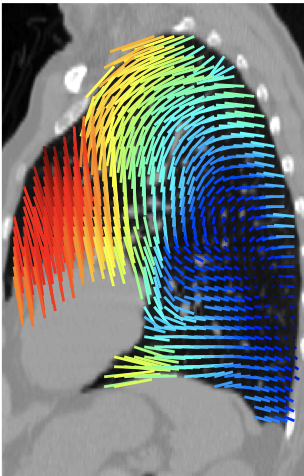corrField

About
Image Version:
20fbff09-2e33-48a7-ba61-83f084ff2ea1 — May 3, 2021
Summary

Correspondence fields for large motion image registration. This algorithm is an extended PyTorch (GPU support) implementation of the corrField method described in [1] and was developed as part of the work for [2].
Source code:¶
- docker (PyTorch, GPU): download
- command line tool (PyTorch, GPU): download
- original code (C++, CPU): download
For further questions or comments please contact us at {hansen,heinrich}@imi.uni-luebeck.de.
[1] Heinrich, Mattias P., Heinz Handels, and Ivor JA Simpson. "Estimating large lung motion in COPD patients by symmetric regularised correspondence fields." International Conference on Medical Image Computing and Computer-Assisted Intervention. Springer, Cham, 2015. [2] Hansen, Lasse, and Mattias P. Heinrich. "GraphRegNet: Deep Graph Regularisation Networks on Sparse Keypoints for Dense Registration of 3D Lung CTs." IEEE Transactions on Medical Imaging (2021).
Mechanism
Left empty by the Algorithm Editors
Interfaces
This algorithm implements all of the following input-output combinations:
| Inputs | Outputs | |
|---|---|---|
| 1 |
Validation and Performance
Left empty by the Algorithm Editors
Uses and Directions
This algorithm was developed for research purposes only.
Warnings
Left empty by the Algorithm Editors
Common Error Messages
Left empty by the Algorithm Editors
Information on this algorithm has been provided by the Algorithm Editors,
following the Model Facts labels guidelines from
Sendak, M.P., Gao, M., Brajer, N. et al.
Presenting machine learning model information to clinical end users with model facts labels.
npj Digit. Med. 3, 41 (2020). 10.1038/s41746-020-0253-3